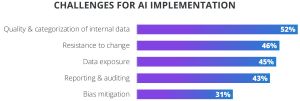Report: AI Adoption Hindered by Data Quality
Data quality is often the biggest issue for organizations looking to implement generative AI technologies, according to a new study from AvePoint. The SaaS solutions provider globally surveyed more than 750 digital workplace leaders to find out how organizations are thinking about AI and data.
The study, published in conjunction with the Association for Intelligent Information Management (AIIM) and the Centre for Information Policy Leadership (CIPL), is titled "AI and Information Management Report." It's an inaugural effort spearheaded by AvePoint, which offers solutions available in more than 100 cloud marketplaces, led by a platform to optimize SaaS operations and secure collaboration.
In a news release, the company said its report "found that nearly every organization experiences challenges when implementing artificial intelligence (AI), with the top challenge being issues with data quality."
 [Click on image for larger view.] AI Implementation Challenges (source: AvePoint).
[Click on image for larger view.] AI Implementation Challenges (source: AvePoint).
That echoes a similar report just published in February by Informatica, covered in the article, "Data Quality Hinders Enterprise Generative AI Adoption, Report Says."
 [Click on image for larger view.] Top Generative AI Challenges (source: Informatica).
[Click on image for larger view.] Top Generative AI Challenges (source: Informatica).
AvePoint indicated that AI adoption could be boosted by more mature information management (IM) strategies, finding orgs in that camp are 1.5 times more likely to realize benefits from AI than those with less mature strategies.
"While 88% of organizations claim to have an information management strategy in place, 44% lack basic measures such as archiving and retention policies and lifecycle management solutions, resulting in an inadequate strategy that contributes to data quality issues, including accuracy, integrity, and excess," the report said.
Other key findings as presented by the company include:
- Organizations Have Serious Concerns Around AI Implementation: Despite widespread optimism around the promise of AI, organizations are concerned about its potential risks, especially as it relates to data privacy and security (71%), quality and categorization of internal data (61%), and integration complexity (59%).
- Many Do Not Govern the Use of Public AI Tools: More than half of organizations (53%) are using public AI tools without implementing an AI Acceptable Use Policy, which can lead to risks like damaging loss of intellectual property and competitive disadvantage.
- Nearly Every Organization Faces Hurdles During AI Implementation: While most organizations (88%) feel prepared for AI, almost all organizations (95%) experience challenges during AI implementation.
- Data Readiness Gap Hinders AI Implementation: Although most organizations (80%) believe their data is ready for AI, more than half (52%) faced challenges with data quality and categorization during implementation, highlighting a significant gap between perceived readiness and reality that must be addressed to successfully implement AI.
- Growing Data Volume Further Challenges Information Management Strategies: 64% of organizations already manage at least 1 PB of data, and 41% manage at least 500 PB of data. This growing data volume further challenges IM strategies, making it crucial for organizations to mature their strategy to manage and optimize their data effectively.
- AI-Ready Data Requires New Information Management Measures: To ensure the accuracy of AI input and output, 77% of organizations acknowledge they must implement new information management measures, and those willing to adapt have the highest levels of confidence in their data's readiness for AI.
- The ROI of AI Investments Hinges on Effective Information Management: Despite only 17% of organizations prioritizing a robust data strategy as the most effective way to ensure return on investments from their AI investments, the survey revealed organizations with mature information management strategies are 1.5x more likely to realize benefits from AI than those with less mature strategies.
- Assessing AI Success Requires Assessing Your Data Too: While 62% of organizations believe that performance metrics like efficiency gains are the best way to measure ROI from AI, it is equally important to assess data quality, including the quality of input data used to train AI models and the quality of output data generated by AI systems, to ensure long-term success.
- As AI Investments Skyrocket, Education is Key: Organizations have invested heavily in AI, yet only 46% of organizations offer AI-specific training. Focusing on AI and information literacy can bridge the gap between access to technology and successful implementation.
"Ultimately, the future of AI will be shaped by the actions that organizations take today. By prioritizing more robust information management strategies, organizations can build a foundation of trust in AI that will enable them to harness its full potential while safeguarding against potential risks and negative consequences," AvePoint said in its summary.
About the Author
David Ramel is an editor and writer at Converge 360.